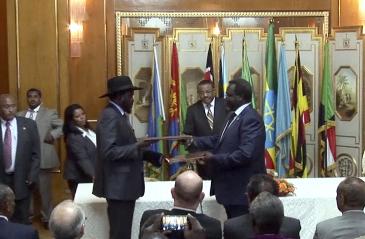Resumption of South Sudan peace talks delayed over agenda disagreement
September 18, 2014 (ADDIS ABABA) – The sixth round of peace talks between South Sudan’s two warring parties and other stakeholders has been delayed to allow discussions over substantial issues and agenda disagreements, as mediators and stakeholders remain locked in an endless round of consultations, a rebel spokesperson has confirmed.

The venue for the talks which is being mediated by the regional bloc of the Intergovernmental Authority on Development (IGAD) was on Monday relocated to the town of Bahir Dar, north of Addis Ababa.
However, the parties have not yet engaged in negotiating substantial issues due to disagreements over the agenda for discussions. Mediators have been consulting with the stakeholders since Monday in order to agree on agenda.
Machar’s spokesperson James Gatdet Dak when reached on Thursday explained that IGAD mediation and the government continued to insist on the “rejected protocol imposed by the regional mediators” as the basis for the talks.
“IGAD seems to continue to mishandle the peace talks against the majority opinion of the stakeholders who should have been the owners of agenda or any document that emerges from the peace process,” Dak told Sudan Tribune on Thursday.
“While the SPLM [in opposition], former SPLM detainees, political parties, civil society organisations and faith-based groups all want the negotiations to resume based on the initial documents produced by thematic committees, IGAD again wants to drag the process back by trying to impose the unpopular protocol.”
“This bias and unjust document was already rejected by all the stakeholders except the government,” he added.
The rebel spokesperson also added that political parties were not part of the recent consultations in Bahir Dar because their leader, Lam Akol, was prevented from leaving Juba by the government.
He also stressed that IGAD should only play the role of mediation and leave the parties to negotiate including deciding on the agenda for discussions.
IGAD heads of state and government in their recent 27th extraordinary summit in Addis Ababa produced a document which they attempted to impose on the warring parties.
Rebel leader Machar refused to sign the protocol document which attempted to set out principles for power-sharing in the transitional government as well as address political, security and economic issues.
The document endorsed president Kiir to continue leading the would-be transitional government for the next two and half years until elections are held.
It also provided for the rebels to nominate a position for a prime minister whose personality would also be approved by president Kiir and would not run for a public office.
Dak however argued that Kiir was “no longer a legitimate president because he oversaw the massacres of over 20,000 ethnic Nuer people who voted him into office” and dragged the country into the current deep crisis.
The rebel leader’s spokesman further argued that the IGAD protocol which tended to impose dictatorship was a “non-starter” and should have been “non-binding.”
He however said if IGAD wanted a serious discussion on the power-sharing protocol it should have proposed that the would-be “prime minister heads the government and its security sectors while the president plays ceremonial role”.
The rebel leader’s spokesperson also said the would-be nominated prime minister by the SPLM rebel faction should not be approved by his rival, Salva Kiir, saying “this was an insult,” adding he should also be eligible for election.
(ST)
